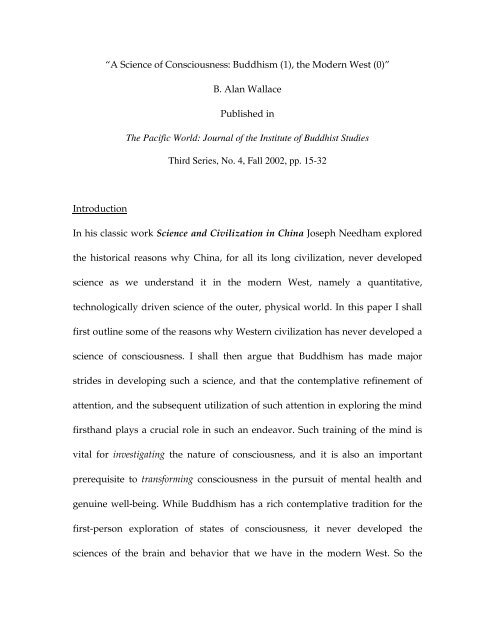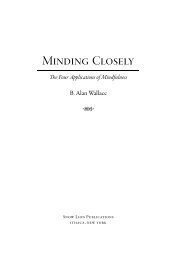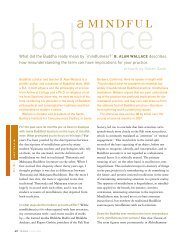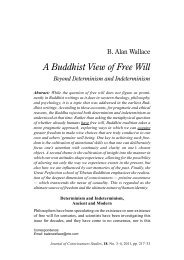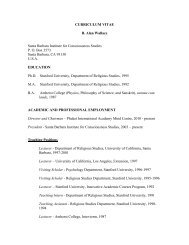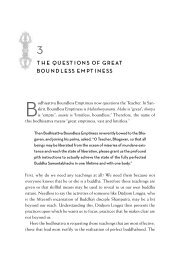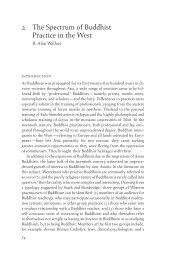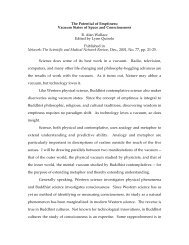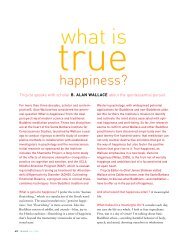“A Science of Consciousness: Buddhism (1), the ... - B. Alan Wallace
“A Science of Consciousness: Buddhism (1), the ... - B. Alan Wallace
“A Science of Consciousness: Buddhism (1), the ... - B. Alan Wallace
You also want an ePaper? Increase the reach of your titles
YUMPU automatically turns print PDFs into web optimized ePapers that Google loves.
Introduction<br />
<strong>“A</strong> <strong>Science</strong> <strong>of</strong> <strong>Consciousness</strong>: <strong>Buddhism</strong> (1), <strong>the</strong> Modern West (0)”<br />
B. <strong>Alan</strong> <strong>Wallace</strong><br />
Published in<br />
The Pacific World: Journal <strong>of</strong> <strong>the</strong> Institute <strong>of</strong> Buddhist Studies<br />
Third Series, No. 4, Fall 2002, pp. 15-32<br />
In his classic work <strong>Science</strong> and Civilization in China Joseph Needham explored<br />
<strong>the</strong> historical reasons why China, for all its long civilization, never developed<br />
science as we understand it in <strong>the</strong> modern West, namely a quantitative,<br />
technologically driven science <strong>of</strong> <strong>the</strong> outer, physical world. In this paper I shall<br />
first outline some <strong>of</strong> <strong>the</strong> reasons why Western civilization has never developed a<br />
science <strong>of</strong> consciousness. I shall <strong>the</strong>n argue that <strong>Buddhism</strong> has made major<br />
strides in developing such a science, and that <strong>the</strong> contemplative refinement <strong>of</strong><br />
attention, and <strong>the</strong> subsequent utilization <strong>of</strong> such attention in exploring <strong>the</strong> mind<br />
firsthand plays a crucial role in such an endeavor. Such training <strong>of</strong> <strong>the</strong> mind is<br />
vital for investigating <strong>the</strong> nature <strong>of</strong> consciousness, and it is also an important<br />
prerequisite to transforming consciousness in <strong>the</strong> pursuit <strong>of</strong> mental health and<br />
genuine well-being. While <strong>Buddhism</strong> has a rich contemplative tradition for <strong>the</strong><br />
first-person exploration <strong>of</strong> states <strong>of</strong> consciousness, it never developed <strong>the</strong><br />
sciences <strong>of</strong> <strong>the</strong> brain and behavior that we have in <strong>the</strong> modern West. So <strong>the</strong>
integration <strong>of</strong> <strong>the</strong> first-person methodologies <strong>of</strong> <strong>Buddhism</strong> with <strong>the</strong> third-person<br />
methodologies <strong>of</strong> <strong>the</strong> cognitive sciences may lead to a richer understanding <strong>of</strong><br />
consciousness than ei<strong>the</strong>r Buddhist or Western civilization has discovered on its<br />
own.<br />
Historical Impediments to <strong>the</strong> Emergence <strong>of</strong> a <strong>Science</strong> <strong>of</strong> <strong>Consciousness</strong> in <strong>the</strong><br />
West<br />
When asking why <strong>the</strong> West has yet to develop a science <strong>of</strong> consciousness, I turn<br />
first to <strong>the</strong> twin roots <strong>of</strong> Western civilization: <strong>the</strong> Greco-Roman and <strong>the</strong> Judeo-<br />
Christian traditions. In general, a pivotal element in <strong>the</strong> emergence <strong>of</strong> a new<br />
science is <strong>the</strong> development and refinement <strong>of</strong> instruments to precisely observe<br />
and possibly experiment with <strong>the</strong> phenomena under investigation. Galileo’s use<br />
<strong>of</strong> <strong>the</strong> telescope to examine <strong>the</strong> sun, moon, and planets signaled <strong>the</strong> emergence <strong>of</strong><br />
<strong>the</strong> science <strong>of</strong> astronomy, much as Van Leeuwenhoek’s use <strong>of</strong> <strong>the</strong> microscope in<br />
observing minute life forms was instrumental to <strong>the</strong> emergence <strong>of</strong> modern<br />
biology. It is <strong>the</strong>refore reasonable to assume that if <strong>the</strong>re is to be, or ever has<br />
been, a science <strong>of</strong> consciousness, it will be heralded by <strong>the</strong> development and<br />
refinement <strong>of</strong> an instrument with which states <strong>of</strong> consciousness can be observed<br />
with rigor and precision. The only instrument humanity has ever had for directly<br />
observing <strong>the</strong> mind is <strong>the</strong> mind itself, so that must be <strong>the</strong> instrument to be<br />
refined. The untrained attention is habitually prone to alternating bouts <strong>of</strong><br />
2
agitation and dullness, so if <strong>the</strong> mind is to be used as a reliable tool for exploring<br />
and experimenting with consciousness, <strong>the</strong>se dysfunctional traits need to be<br />
replaced with attentional stability and vividness.<br />
While <strong>the</strong> philosophers <strong>of</strong> ancient Greece were certainly interested in <strong>the</strong><br />
nature <strong>of</strong> <strong>the</strong> mind, <strong>the</strong>re is little evidence that <strong>the</strong>y developed any sophisticated<br />
means for refining <strong>the</strong> attention. The Pythagorean bro<strong>the</strong>rhood and <strong>the</strong> mystery<br />
schools may have devised such methods, but if <strong>the</strong>y did, such knowledge has not<br />
been preserved. Jewish mystics also wrote extensively on <strong>the</strong> nature <strong>of</strong><br />
consciousness, 1 but <strong>the</strong> development <strong>of</strong> techniques to cultivate attentional<br />
stability and vividness for <strong>the</strong> rigorous exploration <strong>of</strong> consciousness was not a<br />
strong suit <strong>of</strong> this tradition ei<strong>the</strong>r. The Greeks did coin <strong>the</strong> term eudaimonia,<br />
commonly translated as genuine happiness, or human flourishing, referring to<br />
“<strong>the</strong> perfect life” in so far as perfection is attainable by humanity. For Plotinus,<br />
<strong>the</strong> source <strong>of</strong> genuine happiness lies within <strong>the</strong> human spirit, but when <strong>the</strong><br />
concept <strong>of</strong> eudaimonia was absorbed into <strong>the</strong> Christian tradition, Augustine<br />
insisted that <strong>the</strong> soul must look outside itself—to God—for such perfection. 2<br />
However, it must be added that a principal way he taught to go about this<br />
endeavor was through a contemplative process that draws <strong>the</strong> attention inwards,<br />
going beyond <strong>the</strong> self to a direct encounter with God, <strong>the</strong> very source <strong>of</strong><br />
eudaimonia. 3 In this regard, perhaps <strong>the</strong> fundamental difference between Plotinus<br />
3
and Augustine has to do with <strong>the</strong>ir views on <strong>the</strong> parameters <strong>of</strong> human identity,<br />
<strong>the</strong> boundary between <strong>the</strong> human soul and <strong>the</strong> divine.<br />
Within <strong>the</strong> Christian tradition, <strong>the</strong> early desert fa<strong>the</strong>rs were certainly<br />
aware <strong>of</strong> <strong>the</strong> need to calm <strong>the</strong> mind, as is evidenced in <strong>the</strong> seminal fifth-century<br />
volume on contemplative practice entitled The Conferences <strong>of</strong> Cassian. 4 But it is not<br />
clear that Christian contemplatives <strong>of</strong> that period or <strong>the</strong> later medieval era<br />
devised effective means for training <strong>the</strong> attention as a means for observing<br />
mental events. This failure may be at least in part responsible for <strong>the</strong> widespread<br />
conclusion among Christian mystics that <strong>the</strong> highest states <strong>of</strong> contemplation are<br />
necessarily fleeting, commonly lasting no longer than about half an hour. 5 This<br />
insistence on <strong>the</strong> fleeting nature <strong>of</strong> mystical union appears to originate with<br />
Augustine, 6 and it is reflected almost a millennium later in <strong>the</strong> writings <strong>of</strong><br />
Meister Eckhart, who emphasized that <strong>the</strong> state <strong>of</strong> contemplative rapture is<br />
invariably transient, with even its residual effects lasting no longer than three<br />
days. 7<br />
With <strong>the</strong> advent <strong>of</strong> <strong>the</strong> Protestant Reformation and <strong>the</strong> Scientific<br />
Revolution, <strong>the</strong> gradual decline <strong>of</strong> Christian contemplative inquiry into <strong>the</strong><br />
nature <strong>of</strong> consciousness rapidly accelerated. Given <strong>the</strong> Protestant emphasis on<br />
<strong>the</strong> Augustinian <strong>the</strong>me <strong>of</strong> <strong>the</strong> essential iniquity <strong>of</strong> <strong>the</strong> human soul, and man’s<br />
utter inability to achieve salvation or know God except by faith, <strong>the</strong>re was no<br />
longer any <strong>the</strong>ological incentive for such inquiry. Salvation was emphatically<br />
4
presented as an undeserved gift from <strong>the</strong> Creator. So genuine happiness, which<br />
is to be truly experienced only in <strong>the</strong> hereafter, is in no way earned by<br />
understanding <strong>the</strong> mind or achieving exceptional states <strong>of</strong> mental health and<br />
balance.<br />
Descartes, whose ideological influence on <strong>the</strong> Scientific Revolution is hard<br />
to overestimate, was deeply committed to <strong>the</strong> introspective examination <strong>of</strong> <strong>the</strong><br />
mind. But like his Greek and Christian predecessors, he did not devise means to<br />
refine <strong>the</strong> attention so that <strong>the</strong> mind could reliably be used to observe mental<br />
events. On <strong>the</strong> contrary, he naively believed that anything that was clearly and<br />
distinctly perceived by means <strong>of</strong> introspection was invariably valid—an<br />
assumption that was effectively refuted by William James at <strong>the</strong> end <strong>of</strong> <strong>the</strong><br />
nineteenth century. 8 Moreover, in a <strong>the</strong>ological move that effectively removed<br />
<strong>the</strong> human mind from <strong>the</strong> natural world, Descartes decreed that <strong>the</strong> soul is<br />
divinely infused into <strong>the</strong> body, where it exerts its influence on <strong>the</strong> body by way<br />
<strong>of</strong> <strong>the</strong> pineal gland. It was this gland, he believed, that, on decision <strong>of</strong> <strong>the</strong> soul,<br />
induces <strong>the</strong> voluntary actions <strong>of</strong> <strong>the</strong> body, while all o<strong>the</strong>r actions are reflexive.<br />
This philosophical stance probably accounts in large part for <strong>the</strong> fact that <strong>the</strong><br />
Western scientific study <strong>of</strong> <strong>the</strong> mind did not even begin for more than two<br />
centuries after Descartes. And until <strong>the</strong> last three decades <strong>of</strong> <strong>the</strong> twentieth<br />
century, <strong>the</strong> pineal gland was uniquely neglected by physiological and<br />
biochemical investigators. Although various factors may be responsible for <strong>the</strong><br />
5
scientific avoidance <strong>of</strong> this region <strong>of</strong> <strong>the</strong> brain, it seems plausible that one reason<br />
was that, given <strong>the</strong> special status attributed to it by Descartes, it was still<br />
considered to be outside <strong>the</strong> proper domain <strong>of</strong> natural science.<br />
Ano<strong>the</strong>r trend in Europe at <strong>the</strong> dawn <strong>of</strong> <strong>the</strong> modern era provided yet a<br />
fur<strong>the</strong>r incentive for not delving deeply into <strong>the</strong> human mind, and that was <strong>the</strong><br />
witch-hunting craze from <strong>the</strong> late fifteenth century through <strong>the</strong> mid-seventeenth<br />
century. During this period, anyone who exhibited exceptional mental powers,<br />
including <strong>the</strong> power <strong>of</strong> spiritual healing, was immediately suspect <strong>of</strong> being a<br />
witch. While nearly all traditional societies have believed in witchcraft, <strong>the</strong><br />
Christian tradition in particular attributed <strong>the</strong> powers <strong>of</strong> witches to <strong>the</strong> Devil,<br />
which is <strong>the</strong> rationale for <strong>the</strong> biblical commandment that such people are to be<br />
put to death. 9 The common belief that demons and o<strong>the</strong>r spiritual entities roved<br />
about in <strong>the</strong> natural world (sometimes taking possession <strong>of</strong> human souls) was <strong>of</strong><br />
course deeply incompatible with <strong>the</strong> emerging mechanical view <strong>of</strong> <strong>the</strong> universe.<br />
After all, scientists couldn’t very well establish orderly physical laws in <strong>the</strong><br />
objective world as long as <strong>the</strong>re were immaterial spirits roving about,<br />
intervening at will in <strong>the</strong> affairs <strong>of</strong> man and nature. So many natural<br />
philosophers <strong>of</strong> <strong>the</strong> late sixteenth century simply dismissed <strong>the</strong>m as illusions.<br />
Newton, on <strong>the</strong> o<strong>the</strong>r hand, who devoted much <strong>of</strong> his time to developing his<br />
own <strong>the</strong>ology, withdrew evil spirits from <strong>the</strong> objective physical world and<br />
placed <strong>the</strong>m inside <strong>the</strong> human mind in <strong>the</strong> form <strong>of</strong> mental disorders. God’s outer<br />
6
creation had now been cleansed <strong>of</strong> <strong>the</strong>se contaminating influences, leaving only<br />
<strong>the</strong> inner being <strong>of</strong> man defiled. It would take ano<strong>the</strong>r two hundred years before<br />
Western psychoanalysts would have <strong>the</strong> nerve to begin <strong>the</strong> scientific exploration<br />
<strong>of</strong> <strong>the</strong>se dark inner realities.<br />
In short, <strong>the</strong> trajectory <strong>of</strong> Western science from <strong>the</strong> time <strong>of</strong> Copernicus to<br />
<strong>the</strong> modern day seems to have been influenced by medieval Christian<br />
cosmology. Just as hell was symbolized as being in <strong>the</strong> center <strong>of</strong> <strong>the</strong> earth, and<br />
heaven was in <strong>the</strong> outermost reaches <strong>of</strong> space, <strong>the</strong> inner, subjective world <strong>of</strong> man<br />
was depicted as being <strong>the</strong> locus <strong>of</strong> evil, while <strong>the</strong> objective world was free <strong>of</strong><br />
such moral contamination. It hardly seems an accident that <strong>the</strong> science that<br />
initiated <strong>the</strong> Scientific Revolution was astronomy, and it took a full three<br />
hundred years for <strong>the</strong> scientific discipline <strong>of</strong> psychology to begin. And it was<br />
only in <strong>the</strong> closing years <strong>of</strong> <strong>the</strong> twentieth century that <strong>the</strong> scientific community<br />
began to regard consciousness as a legitimate subject <strong>of</strong> scientific inquiry.<br />
Why did it take psychology—which itself emerged only after many<br />
scientists felt that <strong>the</strong>y had already discovered all <strong>the</strong> principal laws <strong>of</strong> <strong>the</strong><br />
universe—a century before it began to address <strong>the</strong> nature <strong>of</strong> consciousness? This<br />
was due in large part to <strong>the</strong> fifty-year domination <strong>of</strong> academic psychology by<br />
behaviorism. In 1913, <strong>the</strong> American behaviorist John B. Watson declared that<br />
psychologists must avoid <strong>the</strong> use <strong>of</strong> all subjective terms such as sensation,<br />
perception, image, desire, purpose, and even thinking and emotion as <strong>the</strong>y are<br />
7
subjectively defined. And he attributed belief in <strong>the</strong> very existence <strong>of</strong><br />
consciousness to ancient superstitions and magic. 10 Forty years later, B. F.<br />
Skinner echoed this <strong>the</strong>me by asserting that mind as such does not exist at all,<br />
only dispositions for behavior. It took ano<strong>the</strong>r decade before <strong>the</strong> futility <strong>of</strong><br />
equating subjective mental processes with “objective” behavioral dispositions<br />
became increasingly apparent to <strong>the</strong> scientific community. The behaviorist<br />
approach did nothing to explain <strong>the</strong> nature <strong>of</strong> <strong>the</strong> mind, let alone consciousness;<br />
it just reduced <strong>the</strong>se subjective phenomena to a class <strong>of</strong> objective processes <strong>the</strong>y<br />
could study with <strong>the</strong> available tools <strong>of</strong> science.<br />
With <strong>the</strong> emergence <strong>of</strong> cognitive psychology during <strong>the</strong> 1960s, subjective<br />
experience was once again allowed back into <strong>the</strong> realm <strong>of</strong> scientific research, but<br />
<strong>the</strong> role <strong>of</strong> introspection in exploring <strong>the</strong> mind was still marginalized in this field,<br />
just as it is in <strong>the</strong> rapidly progressing discipline <strong>of</strong> neuroscience. Ra<strong>the</strong>r than<br />
equating mental processes with behavioral dispositions, cognitive psychologists<br />
and neuroscientists now equate <strong>the</strong>m with neural events. As neurologist Antonio<br />
R. Damasio recently commented, “<strong>the</strong> biological processes now presumed to<br />
correspond to mind processes in fact are mind processes and will be seen to be so<br />
when understood in sufficient detail…<strong>the</strong> private personal mind…indeed is<br />
biological and will one day be described in terms both biological and mental.” 11<br />
However, what neuroscientists actually know is that specific neural events (N) are<br />
correlated to specific mental events (M), such that if N occurs, M occurs; if M<br />
8
occurs, N occurs; if N doesn’t occur, M doesn’t occur; and if M doesn’t occur, N<br />
doesn’t occur. Such a correlation could imply that <strong>the</strong> occurrence <strong>of</strong> N has a<br />
causal role in <strong>the</strong> production <strong>of</strong> M, or vice versa; or it could imply that N and M<br />
are actually <strong>the</strong> same phenomenon viewed from different perspectives. There is<br />
not enough scientific knowledge at this point to determine which <strong>of</strong> <strong>the</strong>se types<br />
<strong>of</strong> correlation is <strong>the</strong> correct one. But Damasio seems to overlook this ambiguity<br />
and simply decrees <strong>the</strong> equivalence <strong>of</strong> mental and neural processes, without any<br />
logical or empirical justification. In o<strong>the</strong>r words, this equivalence is simply a<br />
metaphysical belief.<br />
While writing this essay, I questioned Damasio on this point, and he<br />
responded that in his book The Feeling <strong>of</strong> What Happens 12 he goes to great pains to<br />
explain that neural patterns are not equivalent to mental images. There is an<br />
explanatory gap, he points out, regarding <strong>the</strong> process by which a neural pattern<br />
is converted to a mental image; and neuroscience, in particular, and science, in<br />
general, may never be able to bridge that gap. He fur<strong>the</strong>r acknowledges that <strong>the</strong><br />
“physicality” <strong>of</strong> mental phenomena has not yet been identified scientifically; it is<br />
simply a working hypo<strong>the</strong>sis. As hard as I try, I just can't see <strong>the</strong> logic in his<br />
position. To say that A is B, implies an identity, not a causal relation between two<br />
distinct entities A and B. He seems to be saying that mental phenomena are<br />
biological phenomena produced by prior biological phenomena. But that still<br />
implies that mental phenomena are equivalent to some kind <strong>of</strong> biological<br />
9
phenomena. So <strong>the</strong> distinction between mental and neural processes fades out<br />
immediately.<br />
In <strong>the</strong> book cited above, Damasio explains why neuroscience has been<br />
wrong about not making clear <strong>the</strong> distinctions between first-person and third-<br />
person views regarding discussions on mind and consciousness. This is an<br />
important and valid point. At <strong>the</strong> same time, he seems to advocate that in <strong>the</strong><br />
final analysis, mental processes are <strong>the</strong>ir neural correlates viewed from a first-<br />
person perspective; and neural processes are <strong>the</strong>ir mental correlates viewed from<br />
a third-person perspective. But this widespread belief is just that—an speculative<br />
hypo<strong>the</strong>sis—and not a scientifically demonstrated conclusion, despite <strong>the</strong> fact<br />
that it is commonly taken for granted by researchers in this field.<br />
How does Damasio explain <strong>the</strong> fact that <strong>the</strong> neural processes that he<br />
equates with mental processes have <strong>the</strong> capacity to be about o<strong>the</strong>r things? This<br />
question, called <strong>the</strong> hard problem, is regarded by many philosophers as a<br />
formidable, unsolved mystery. But Damasio assures his readers that this turns<br />
out to be no mystery at all: “evolution has crafted a brain that is in <strong>the</strong> business<br />
<strong>of</strong> directly representing <strong>the</strong> organism and indirectly representing whatever <strong>the</strong><br />
organism interacts with.” Brain cells, he declares, “designed to be about o<strong>the</strong>r<br />
things and o<strong>the</strong>r doings.” 13 In short, his solution to this problem is that <strong>the</strong> brain<br />
has <strong>the</strong> capacity to represent o<strong>the</strong>r things because it was designed that way “by<br />
evolution.” This “explanation” obviously illuminates nothing o<strong>the</strong>r than <strong>the</strong> fact<br />
10
that Damasio has great faith in <strong>the</strong> mysterious ways <strong>of</strong> evolution, which for <strong>the</strong><br />
biologist here takes on <strong>the</strong> role <strong>the</strong>ologians have long ascribed to God.<br />
Mental events viewed introspectively appear to be radically different<br />
types <strong>of</strong> processes than neural events viewed objectively. Moreover, if one<br />
confines oneself to <strong>the</strong> introspective examination <strong>of</strong> <strong>the</strong> mind, one evidently<br />
learns little if anything about <strong>the</strong> brain. And if brain scientists were to confine<br />
<strong>the</strong>ir research to <strong>the</strong> brain alone, without reference to any first-person reports <strong>of</strong><br />
mental experience, <strong>the</strong>y would learn little if anything about <strong>the</strong> mind. Indeed,<br />
<strong>the</strong>y would have no reason, on <strong>the</strong> basis <strong>of</strong> neural events alone, to conclude that<br />
<strong>the</strong>y are correlated to any mental events at all. Damasio accounts for this<br />
disparity as follows: “The appearance <strong>of</strong> a gulf between mental states and<br />
physical/biological phenomena comes from <strong>the</strong> large disparity between two<br />
bodies <strong>of</strong> knowledge—<strong>the</strong> good understanding <strong>of</strong> mind we have achieved<br />
through centuries <strong>of</strong> introspection and <strong>the</strong> efforts <strong>of</strong> cognitive science versus <strong>the</strong><br />
incomplete neural specification we have achieved through <strong>the</strong> efforts <strong>of</strong><br />
neuroscience.” 14<br />
Many contemporary scientists and philosophers would challenge his<br />
assertion that we now have “a good understanding” <strong>of</strong> <strong>the</strong> mind as a result <strong>of</strong><br />
centuries <strong>of</strong> introspection and discoveries in cognitive science. Biologist Edward<br />
O. Wilson maintains that logic launched from introspection is limited and<br />
usually unreliable, which is why even today people know more about <strong>the</strong>ir<br />
11
automobiles than <strong>the</strong>y do about <strong>the</strong>ir own minds. 15 The general consensus<br />
among psychologists is that introspection is an unreliable means for<br />
investigating <strong>the</strong> mind. As for our current understanding <strong>of</strong> <strong>the</strong> mind and<br />
consciousness, two <strong>of</strong> America’s most prominent philosophers <strong>of</strong> mind<br />
comment, “<strong>Consciousness</strong> stands alone today as a topic that <strong>of</strong>ten leaves even<br />
<strong>the</strong> most sophisticated thinkers tongue-tied and confused,” 16 and “where <strong>the</strong><br />
mind is concerned we are characteristically confused and in disagreement.” 17 The<br />
real gist <strong>of</strong> Damasio’s assertion seems to be that we already have enough<br />
understanding <strong>of</strong> mental processes <strong>the</strong>mselves, so now <strong>the</strong> emphasis should be<br />
placed on neuroscience to explore <strong>the</strong> biological processes that are, after all, <strong>the</strong><br />
same as mental processes, just viewed from an objective perspective.<br />
If scientists were presented with a new instrument for observing a specific<br />
type <strong>of</strong> natural phenomena, <strong>the</strong> first logical step for <strong>the</strong>m to take before using<br />
this instrument would be to examine its nature and capacities. Does this<br />
instrument present <strong>the</strong> scientists merely its own artifacts, like looking through a<br />
kaleidoscope, or does it provide <strong>the</strong>m with data that exist independently <strong>of</strong> it? If<br />
it does yield such information, does it distort it in <strong>the</strong> process <strong>of</strong> bringing it to<br />
<strong>the</strong>m, or does it provide <strong>the</strong>m with truly objective data from a source<br />
independent <strong>of</strong> <strong>the</strong> instrument? Only after <strong>the</strong>y have understood <strong>the</strong> design,<br />
functioning, reliability, and capacities <strong>of</strong> <strong>the</strong> instrument could <strong>the</strong>y confidently<br />
use it to collect data.<br />
12
The primary instrument that all scientists have used to make any type <strong>of</strong><br />
observation is <strong>the</strong> human mind. Does this instrument provide us only with its<br />
own artifacts, without any access to any objective reality existing independently<br />
<strong>of</strong> <strong>the</strong> mind? Or if <strong>the</strong> mind provides us with information about <strong>the</strong> objective<br />
world, does it distort it in <strong>the</strong> process? For reasons outlined above, <strong>the</strong> scientific<br />
study <strong>of</strong> <strong>the</strong> mind in <strong>the</strong> West was delayed for three centuries after <strong>the</strong> inception<br />
<strong>of</strong> <strong>the</strong> Scientific Revolution, which is tantamount to using an instrument for three<br />
hundred years before subjecting it to scientific scrutiny.<br />
What kind <strong>of</strong> scientific worldview has emerged as a result <strong>of</strong> this<br />
pr<strong>of</strong>ound oversight and <strong>the</strong> enormous disparity <strong>of</strong> our understanding <strong>of</strong> <strong>the</strong><br />
mind and <strong>the</strong> rest <strong>of</strong> <strong>the</strong> natural world? Wilson expresses <strong>the</strong> view <strong>of</strong> many<br />
scientists with his assertion that outside our heads <strong>the</strong>re is an independent,<br />
objective world, and inside our heads is a reconstitution <strong>of</strong> reality based on<br />
sensory input and <strong>the</strong> self-assembly <strong>of</strong> concepts. The proper task <strong>of</strong> scientists, he<br />
claims is to correctly align our inner representations <strong>of</strong> reality with <strong>the</strong> world<br />
outside our heads. 18 The problem here, which he openly acknowledges, is that<br />
scientists have no body <strong>of</strong> external objective truth by which <strong>the</strong> alignment <strong>of</strong><br />
scientific <strong>the</strong>ories and <strong>the</strong> world outside our heads can be calibrated. In o<strong>the</strong>r<br />
words, <strong>the</strong> empirical data that we perceive, toge<strong>the</strong>r with our scientific <strong>the</strong>ories<br />
that account for <strong>the</strong>m, all consists <strong>of</strong> mental representations “within our heads”;<br />
13
and we have no objective yardstick with which to compare those representations<br />
with what we assume to be <strong>the</strong> “real world.”<br />
How are we to get out <strong>of</strong> this conundrum? Wilson suggests, “Criteria <strong>of</strong><br />
objective truth might be attainable through empirical investigation. The key lies<br />
in clarifying <strong>the</strong> still poorly understood operations composing <strong>the</strong> mind and in<br />
improving <strong>the</strong> piecemeal approach science has taken to its material properties.” 19<br />
Like Damasio, Wilson assumes that <strong>the</strong> mind is actually composed <strong>of</strong> brain<br />
processes, but as I have already pointed out, at this point such an assertion is<br />
simply a metaphysical belief, not a scientifically established fact. Given how little<br />
scientists presently understand about <strong>the</strong> relation between <strong>the</strong> mind and brain, it<br />
would be far more objective to regard this as a topic to be researched with an<br />
open mind, ra<strong>the</strong>r than assuming (or demanding) that science will one day<br />
confirm our current materialistic biases.<br />
In order to understand <strong>the</strong> relation between scientific <strong>the</strong>ories and <strong>the</strong><br />
objective phenomena <strong>the</strong>y ostensibly represent, we clearly need to have a more<br />
thorough, scientific understanding <strong>of</strong> <strong>the</strong> mind. As I commented earlier, <strong>the</strong> first<br />
step in developing a science <strong>of</strong> any kind <strong>of</strong> phenomena is to develop and refine<br />
instruments that allow one to observe and possibly experiment with <strong>the</strong><br />
phenomena under investigation. The only instrument we have that enables us to<br />
observe mental phenomena directly is <strong>the</strong> mind itself. But since <strong>the</strong> time <strong>of</strong><br />
Aristotle, <strong>the</strong> West has made little if any progress in developing means <strong>of</strong><br />
14
efining <strong>the</strong> mind so that it can be used as a reliable instrument for observing<br />
mental events. And judging by <strong>the</strong> writings <strong>of</strong> many scientists, such as E. O.<br />
Wilson, <strong>the</strong>re continues to be considerable resistance against developing any<br />
such empirical science even today.<br />
Thus, if we follow this present materialistic trend, no such empirical<br />
science <strong>of</strong> consciousness is likely to emerge in <strong>the</strong> foreseeable future. Ra<strong>the</strong>r, if<br />
<strong>the</strong> cognitive sciences continue to be constrained by <strong>the</strong> metaphysical dictates <strong>of</strong><br />
scientific materialism, 20 all we will do is reduce consciousness to something that<br />
can be explored and understood within <strong>the</strong> parameters <strong>of</strong> that dogma, as various<br />
researchers, such as Crick and Koch, 21 are already attempting to do. Just as<br />
kinematics (<strong>the</strong> phenomenological study <strong>of</strong> matter in motion) must precede<br />
mechanics in <strong>the</strong> study <strong>of</strong> physics, <strong>the</strong> rigorous, firsthand investigation <strong>of</strong><br />
consciousness must precede any formulation <strong>of</strong> <strong>the</strong> mechanisms that account <strong>the</strong><br />
emergence <strong>of</strong> consciousness.<br />
Modern science has never developed a rigorous introspective<br />
methodology for observing <strong>the</strong> phenomena <strong>of</strong> conscious mental processes and<br />
states. William James, <strong>the</strong> foremost pioneer <strong>of</strong> American psychology,<br />
acknowledged <strong>the</strong> importance <strong>of</strong> studying behavioral and neural correlates to<br />
mental processes, but he emphasized <strong>the</strong> primary role <strong>of</strong> introspection in this<br />
endeavor. 22 However, <strong>the</strong> untrained mind, which is prone to alternating agitation<br />
and dullness, is an unreliable and inadequate instrument for observing anything.<br />
15
To transform it into a suitable instrument for scientific exploration, <strong>the</strong> stability<br />
and vividness <strong>of</strong> <strong>the</strong> attention must be developed to a high degree. James was<br />
well aware <strong>of</strong> <strong>the</strong> importance <strong>of</strong> developing such sustained, voluntary<br />
attention, 23 but he acknowledged that he did not know how to achieve this task. 24<br />
To sum up, <strong>the</strong> modern West has developed a sophisticated science <strong>of</strong><br />
behavioral and neural correlates <strong>of</strong> consciousness, but no science <strong>of</strong> consciousness<br />
itself, for it has failed to develop sophisticated, rigorous means <strong>of</strong> exploring <strong>the</strong><br />
phenomena <strong>of</strong> consciousness firsthand. And this is <strong>the</strong> first step towards an<br />
empirical science <strong>of</strong> any class <strong>of</strong> natural phenomena. Thus with regard to<br />
exploring <strong>the</strong> nature, origins, and potentials <strong>of</strong> consciousness, cognitive scientists<br />
and neuroscientists are more like astrologers (who carefully examine correlates<br />
between <strong>the</strong> celestial and terrestrial phenomena) than astronomers (who<br />
carefully examine celestial phenomena <strong>the</strong>mselves).<br />
A second result <strong>of</strong> <strong>the</strong> historical development <strong>of</strong> science is that <strong>the</strong> modern<br />
West has an elaborate science <strong>of</strong> mental illness, but no science <strong>of</strong> mental health.<br />
Indeed <strong>the</strong>re is hardly any scientific consensus on <strong>the</strong> criteria by which to<br />
identify mental health. Nor do we in <strong>the</strong> West have any science that shows how<br />
to cultivate extraordinary mental health or genuine happiness. In short, <strong>the</strong><br />
<strong>the</strong>me <strong>of</strong> eudaimonia, a state human flourishing sometimes glossed as a “truth-<br />
given joy,” has been forgotten in modern science, 25 and <strong>the</strong> very existence <strong>of</strong> a<br />
16
truth that yields such well-being has no place in <strong>the</strong> scientific view <strong>of</strong> human<br />
existence or <strong>the</strong> universe at large.<br />
In short, <strong>the</strong> West presently has no pure science <strong>of</strong> consciousness that<br />
reveals <strong>the</strong> nature, origins, and potentials <strong>of</strong> this natural phenomenon, and it<br />
similarly lacks an applied science <strong>of</strong> consciousness that reveals means for refining<br />
and enhancing consciousness and <strong>the</strong>reby achieving eudaimonia. But <strong>the</strong> fact that<br />
<strong>the</strong> West has failed to develop such a science does not necessarily imply that all<br />
o<strong>the</strong>r human civilizations throughout history have been equally deficient in this<br />
regard.<br />
The Buddhist <strong>Science</strong> <strong>of</strong> <strong>Consciousness</strong><br />
Over <strong>the</strong> course <strong>of</strong> its 2500-year history, <strong>Buddhism</strong> has developed rigorous<br />
methods for refining <strong>the</strong> attention, and <strong>the</strong>n applying that attention to exploring<br />
<strong>the</strong> origins, nature, and role <strong>of</strong> consciousness in <strong>the</strong> natural world. The empirical<br />
and rational investigations and discoveries by such great Indian contemplatives<br />
as Gautama <strong>the</strong> Buddha pr<strong>of</strong>oundly challenge many <strong>of</strong> <strong>the</strong> assumptions <strong>of</strong> <strong>the</strong><br />
modern West, particularly those <strong>of</strong> scientific materialism. This meeting <strong>of</strong><br />
Buddhist and modern Western science also challenges our very notion <strong>of</strong><br />
“metaphysics.” In <strong>the</strong> nineteenth century, <strong>the</strong> origins <strong>of</strong> <strong>the</strong> physical universe,<br />
<strong>the</strong> constitution <strong>of</strong> distant galaxies, and <strong>the</strong> internal structure <strong>of</strong> molecules were<br />
all metaphysical issues. At that time, <strong>the</strong>re were no known ways <strong>of</strong> exploring<br />
17
<strong>the</strong>se topics empirically, but that is no longer <strong>the</strong> case. In <strong>the</strong> twenty-first century,<br />
<strong>the</strong> nature, origins, and destiny <strong>of</strong> human consciousness are still metaphysical<br />
issues for <strong>the</strong> West, but are <strong>the</strong>y similarly clouded in mystery within <strong>the</strong><br />
Buddhist tradition?<br />
As new empirical strategies are devised for exploring phenomena,<br />
metaphysics gives way to science, mere belief is supplanted by knowledge. The<br />
approach that has repeatedly allowed for this gradual illumination <strong>of</strong> <strong>the</strong> natural<br />
world is called <strong>the</strong> scientific method. Webster’s Ninth New Collegiate Dictionary<br />
defines this as follows: “Principles and procedures for <strong>the</strong> systematic pursuit <strong>of</strong><br />
knowledge involving <strong>the</strong> recognition and formulation <strong>of</strong> a problem, <strong>the</strong><br />
collection <strong>of</strong> data through observation and experiment, and <strong>the</strong> formulation and<br />
testing <strong>of</strong> hypo<strong>the</strong>ses.” Does <strong>Buddhism</strong> include this procedure in its inquiry into<br />
<strong>the</strong> nature <strong>of</strong> <strong>the</strong> mind and consciousness? In general, <strong>the</strong> framework <strong>of</strong> Buddhist<br />
<strong>the</strong>ory and practice consists <strong>of</strong> <strong>the</strong> Four Noble Truths: <strong>the</strong> truths <strong>of</strong> suffering, <strong>the</strong><br />
source <strong>of</strong> suffering, <strong>the</strong> cessation <strong>of</strong> suffering toge<strong>the</strong>r with its source, and <strong>the</strong><br />
path leading to that cessation. While Buddhist contemplatives have always<br />
placed a primary emphasis on fathoming <strong>the</strong> nature <strong>of</strong> <strong>the</strong> mind, <strong>the</strong>ir<br />
orientation to this endeavor has been fundamentally pragmatic. Their first task is<br />
to recognize <strong>the</strong> nature and full range <strong>of</strong> suffering to which humans are<br />
vulnerable. The first noble truth formulates that as <strong>the</strong> problem to be addressed.<br />
The second noble truth presents <strong>the</strong> hypo<strong>the</strong>sis that <strong>the</strong> essential causes <strong>of</strong><br />
18
suffering are to be found within <strong>the</strong> mind, specifically in terms <strong>of</strong> cognitive,<br />
emotional, and attentional imbalances. The third noble truth hypo<strong>the</strong>sizes that<br />
<strong>the</strong>se afflictive tendencies can be irreversibly dispelled from <strong>the</strong> mind. And <strong>the</strong><br />
fourth noble truth presents detailed procedures for collecting data by observing<br />
mental processes and experimenting with techniques for transforming <strong>the</strong> mind<br />
and eliminating its afflictive elements. 26<br />
The very notion <strong>of</strong> observing <strong>the</strong> mind with <strong>the</strong> mind appears problematic<br />
to many thinkers, for it does not allow for <strong>the</strong> separation <strong>of</strong> subject and object<br />
that characterizes o<strong>the</strong>r kinds <strong>of</strong> scientific observations. This is a legitimate<br />
concern. Is it even possible to observe mental states and processes with <strong>the</strong><br />
mind? Even with no mental training, we can detect our emotional states, we can<br />
observe thoughts and images arising in <strong>the</strong> mind, and we can introspectively<br />
recognize from moment to moment whe<strong>the</strong>r our minds are calm or agitated. On<br />
a more basic level, we can perceive that we are conscious—we are aware not only<br />
<strong>of</strong> objects <strong>of</strong> consciousness but <strong>of</strong> <strong>the</strong> presence <strong>of</strong> our own consciousness <strong>of</strong> o<strong>the</strong>r<br />
things. 27 And this faculty <strong>of</strong> mental perception is <strong>the</strong> only instrument we have for<br />
directly observing any mental phenomena. While it is true in this case that <strong>the</strong>re<br />
is no absolute separation between <strong>the</strong> instrument <strong>of</strong> observation and <strong>the</strong><br />
observed phenomena, this fact does not necessarily ban <strong>the</strong> whole procedure<br />
from <strong>the</strong> realm <strong>of</strong> scientific exploration. After all, <strong>the</strong> inextricable relation<br />
between <strong>the</strong> system <strong>of</strong> measurement and <strong>the</strong> measured phenomena is a familiar<br />
19
<strong>the</strong>me in quantum mechanics, but no one has suggested that such measurements<br />
be banned from physics.<br />
In Buddhist contemplative practice, <strong>the</strong> experiential investigation <strong>of</strong> <strong>the</strong><br />
mind, including <strong>the</strong> nature, origins, and potentials <strong>of</strong> consciousness, is <strong>of</strong><br />
paramount significance. But in order for such exploration be penetrating and<br />
reliable and for <strong>the</strong> insights gleaned from this process to be thoroughly<br />
assimilated, <strong>the</strong> attentional imbalances <strong>of</strong> laxity and excitation must first be<br />
dispelled. Only when <strong>the</strong> attention is lucid and calm can it be used effectively in<br />
this venture. 28 The qualities <strong>of</strong> luminosity and stillness are actually innate to <strong>the</strong><br />
relative ground state <strong>of</strong> individual mind, so <strong>the</strong> central challenge <strong>of</strong> this training<br />
is to settle <strong>the</strong> attention in that ground state. One <strong>of</strong> <strong>the</strong> remarkable discoveries <strong>of</strong><br />
Buddhist contemplatives who have penetrated to this ground is that this stratum<br />
<strong>of</strong> consciousness is imbued with an innate quality <strong>of</strong> bliss. In o<strong>the</strong>r words, when<br />
<strong>the</strong> attention is settled in a deep state <strong>of</strong> equilibrium, temporarily free <strong>of</strong> laxity<br />
and excitation, one spontaneously experiences a sense <strong>of</strong> inner peace and well-<br />
being. In order to penetrate to this substrate consciousness, a necessary<br />
prerequisite is <strong>the</strong> cultivation <strong>of</strong> a wholesome way <strong>of</strong> life that supports mental<br />
balance and harmonious relations with o<strong>the</strong>rs. This is <strong>the</strong> essence <strong>of</strong> Buddhist<br />
ethics, which is <strong>the</strong> foundation <strong>of</strong> all Buddhist practice. 29<br />
According to generations <strong>of</strong> Buddhist contemplatives, simply settling <strong>the</strong><br />
attention in <strong>the</strong> substrate consciousness, with a high degree <strong>of</strong> attentional<br />
20
stability and clarity, is not enough to irreversibly free <strong>the</strong> mind <strong>of</strong> afflictions and<br />
obscurations. For this one must penetrate to <strong>the</strong> ultimate ground state <strong>of</strong><br />
consciousness, prior to <strong>the</strong> conceptual demarcations <strong>of</strong> subject and object, mind<br />
and matter, and even existence and nonexistence. This primordial consciousness<br />
is metaphorically described as being empty and luminous, and its has never been<br />
sullied by afflictive imbalances <strong>of</strong> any kind. The realization <strong>of</strong> this state <strong>of</strong><br />
consciousness is said to yield a state <strong>of</strong> well-being, or eudaimonia, that transcends<br />
<strong>the</strong> imagination, and it is <strong>the</strong> unified culmination <strong>of</strong> <strong>the</strong> Buddhist pragmatic<br />
pursuit <strong>of</strong> freedom from suffering and <strong>the</strong> epistemic pursuit <strong>of</strong> knowledge. With<br />
such insight, one comes to understand not only <strong>the</strong> nature <strong>of</strong> consciousness but<br />
<strong>the</strong> relation between mental representations and <strong>the</strong>ir referents in <strong>the</strong> objective<br />
world.<br />
With this understanding <strong>of</strong> three dimensions <strong>of</strong> consciousness—ranging<br />
from <strong>the</strong> psyche that can immediately be viewed introspectively, to <strong>the</strong> substrate<br />
consciousness, to primordial consciousness—<strong>the</strong> Buddhist view <strong>of</strong> <strong>the</strong> mind<br />
challenges many common assumptions in <strong>the</strong> modern West. According to many<br />
psychologists today, <strong>the</strong> normal mind is deemed to be healthy, but it is<br />
never<strong>the</strong>less subject to a wide range <strong>of</strong> mental distress, including depression,<br />
anxiety, and frustration. But <strong>the</strong>se can be managed with drug <strong>the</strong>rapy and<br />
counseling when <strong>the</strong>y become excessive. While unhappiness comes simply from<br />
being human, happiness comes from outside: from <strong>the</strong> sensual and es<strong>the</strong>tic<br />
21
enjoyments, from possessions, from o<strong>the</strong>r people, and, according to religious<br />
believers, from God. The modern Western view <strong>of</strong> <strong>the</strong> mind is still influenced by<br />
<strong>the</strong> Aristotelian assertion that all emotions, in <strong>the</strong> appropriate circumstance and<br />
in moderation, are to be accepted. 30 This believe has been incorporated into <strong>the</strong><br />
<strong>the</strong>ory <strong>of</strong> evolution, which maintains that all our emotions and o<strong>the</strong>r mental<br />
traits must have served us well through human evolution, o<strong>the</strong>rwise we<br />
wouldn’t have <strong>the</strong>m.<br />
In start contrast to <strong>the</strong> above views, Buddhist contemplatives state that <strong>the</strong><br />
ordinary mind is dysfunctional, for it oscillates between states <strong>of</strong> (1) being<br />
obsessive/compulsive (succumbing to compulsive ideation and obsessively<br />
grasping onto thoughts and emotions) and (2) slipping into a stupor. We have<br />
grown habituated to experiencing such a dysfunctional mind and mistakenly<br />
take for granted <strong>the</strong> resultant mental discomfort, believing this to be normal and<br />
reasonably healthy. With this basic sense <strong>of</strong> inner dissatisfaction, we <strong>the</strong>n take<br />
solace in outer and inner pleasurable stimuli, which veil <strong>the</strong> symptoms <strong>of</strong> our<br />
dysfunctional minds. While <strong>the</strong> normal mind is habitually prone to states <strong>of</strong><br />
attentional, emotional, and cognitive imbalances, it is not intrinsically<br />
dysfunctional. By refining <strong>the</strong> attention we can make <strong>the</strong> mind serviceable and<br />
<strong>the</strong>reby rediscover <strong>the</strong> innate sense <strong>of</strong> well-being that emerges spontaneously<br />
from a balanced mind. And by fathoming <strong>the</strong> nature <strong>of</strong> consciousness to its<br />
22
primordial ground, all <strong>the</strong> obscurations <strong>of</strong> <strong>the</strong> mind may be removed, resulting<br />
in irreversible freedom from suffering and its source.<br />
Conclusion<br />
While <strong>the</strong> scientific study <strong>of</strong> consciousness has come into vogue in recent years, it<br />
is overwhelmingly dominated by <strong>the</strong> metaphysical dogma <strong>of</strong> scientific<br />
materialism. The influence <strong>of</strong> belief system does little to impede progress in <strong>the</strong><br />
physical sciences, but its stifling effect is evident in <strong>the</strong> biological sciences<br />
(including medical science) and even more so in <strong>the</strong> cognitive sciences. One <strong>of</strong><br />
<strong>the</strong> most limiting aspects <strong>of</strong> this dogma is that it places a taboo on <strong>the</strong> empirical<br />
investigation <strong>of</strong> subjective events from a first-person perspective. And <strong>the</strong>re is a<br />
widespread refusal among researchers in this field even to consider <strong>the</strong><br />
possibility that mental events may be immaterial in nature, and not simply<br />
epiphenomena <strong>of</strong> <strong>the</strong> brain. Given <strong>the</strong> scientific ideals <strong>of</strong> empiricism and<br />
skepticism, it is ironic that <strong>the</strong> scientific community shows such resistance to <strong>the</strong><br />
first-person, empirical investigation <strong>of</strong> subjective mental events (as opposed to<br />
<strong>the</strong>ir neural correlates) and that <strong>the</strong>y show so little skepticism toward <strong>the</strong><br />
metaphysical claims <strong>of</strong> scientific materialism.<br />
If, as I have argued in this essay, <strong>the</strong> Buddhist tradition has developed a<br />
science <strong>of</strong> consciousness, why is this not commonly acknowledged? On <strong>the</strong> one<br />
hand, it emphasizes an introspective approach to <strong>the</strong> study <strong>of</strong> <strong>the</strong> mind, <strong>the</strong><br />
23
value <strong>of</strong> which is not commonly accepted among scientists. But <strong>the</strong>re are o<strong>the</strong>r<br />
compelling reasons as well. Over <strong>the</strong> centuries <strong>Buddhism</strong> become decreasingly<br />
empirical in its orientation to understanding human existence, and in <strong>the</strong> process<br />
elements <strong>of</strong> dogmatism and scholasticism have become increasingly prevalent. 31<br />
This degenerating trend has been exacerbated by much modern academic<br />
scholarship in <strong>the</strong> field <strong>of</strong> Buddhist studies, which tends to ignore <strong>the</strong><br />
exceptional experiences and insights <strong>of</strong> Buddhist adepts, refusing even to<br />
consider <strong>the</strong> possibility that <strong>the</strong>y may have made extraordinary discoveries that<br />
may be pertinent to our contemporary understanding <strong>of</strong> <strong>the</strong> mind and its role in<br />
nature. In <strong>the</strong> most extreme cases, Western Buddhologists even go so far as to<br />
make <strong>the</strong> absurd claim that experience has never played a prominent role in<br />
Buddhist practice. 32 But <strong>the</strong> problem is not just in <strong>the</strong> representation <strong>of</strong> Buddhist<br />
practice in this West. Over <strong>the</strong> centuries <strong>the</strong> spirit <strong>of</strong> open-minded inquiry seems<br />
to have faded among both Buddhist scholars and contemplatives. This has gotten<br />
to such a point, according to one contemporary Tibetan Buddhist scholar, that<br />
<strong>the</strong> primary concern <strong>of</strong> many Buddhist meditators is mainly to ensure that <strong>the</strong>y<br />
are following <strong>the</strong> correct procedure <strong>of</strong> a meditation technique, ra<strong>the</strong>r than<br />
rigorously exploring <strong>the</strong> nature <strong>of</strong> <strong>the</strong> mind or anything else. 33<br />
During <strong>the</strong> Renaissance, Europe emerged from <strong>the</strong> shackles <strong>of</strong> religious<br />
dogma in part because <strong>of</strong> <strong>the</strong> influx <strong>of</strong> fresh and provocative ideas from classical<br />
Greece and <strong>the</strong> Arab world. Now <strong>the</strong> West (and all o<strong>the</strong>r countries dominated by<br />
24
<strong>the</strong> West) is in need <strong>of</strong> a Renaissance to free it from <strong>the</strong> intellectual tyranny <strong>of</strong><br />
scientific materialism, which is <strong>of</strong>ten falsely conflated with science itself. The<br />
Buddhist tradition, especially if it is re-instilled with <strong>the</strong> spirit <strong>of</strong> empiricism and<br />
skepticism, may play an important role in such a Renaissance.<br />
Researchers in <strong>the</strong> mind/body problem commonly appeal to <strong>the</strong> authority<br />
<strong>of</strong> future scientists to confirm <strong>the</strong>ir present materialistic assumptions about <strong>the</strong><br />
nature <strong>of</strong> consciousness. Antonio R. Damasio, for example, claims “it is probably<br />
safe to say that by 2050 sufficient knowledge <strong>of</strong> biological phenomena will have<br />
wiped out <strong>the</strong> traditional dualistic separations <strong>of</strong> body/brain, body/mind and<br />
brain/mind.” 34 It took <strong>the</strong> scientific community fifty years to recognize that <strong>the</strong><br />
mind couldn’t meaningfully be reduced to a set <strong>of</strong> behavioral dispositions.<br />
Hopefully it will not take that long before neuroscientists open <strong>the</strong>ir minds to <strong>the</strong><br />
possibility that <strong>the</strong> mind may not be meaningfully reduced to neural<br />
mechanisms ei<strong>the</strong>r.<br />
While science characteristically embraces <strong>the</strong> “disturbingly new,” it has a<br />
much harder time embracing <strong>the</strong> “disturbingly old,” namely, discoveries that<br />
were made long ago (let alone in an alien civilization), prior to <strong>the</strong> Scientific<br />
Revolution. Many Buddhists, on <strong>the</strong> o<strong>the</strong>r hand, rely so heavily on <strong>the</strong> insights <strong>of</strong><br />
<strong>the</strong> Buddha and later contemplatives <strong>of</strong> <strong>the</strong> past, that <strong>the</strong>y have a hard time<br />
embracing disturbing new discoveries that challenge Buddhist beliefs. Scientific<br />
materialists are so confident that <strong>the</strong> mind is nothing more than a biological<br />
25
phenomenon that <strong>the</strong>y confuse this belief with scientific knowledge. Similarly,<br />
many traditional Buddhists are so confident <strong>of</strong> <strong>the</strong> validity <strong>of</strong> <strong>the</strong>ir doctrine that<br />
<strong>the</strong>y confuse <strong>the</strong>ir belief with contemplative knowledge. In his book The<br />
Discoverers: A History <strong>of</strong> Man’s Search to Know His World and Himself, historian<br />
Daniel J. Boorstin refers to “<strong>the</strong> illusions <strong>of</strong> knowledge” as <strong>the</strong> principle obstacles<br />
to discovery. The great discoverers <strong>of</strong> <strong>the</strong> past, he declares, “had to battle against<br />
<strong>the</strong> current ‘facts’ and dogmas <strong>of</strong> <strong>the</strong> learned.” 35<br />
The scientific tradition has now joined <strong>the</strong> Buddhist tradition in its pursuit<br />
<strong>of</strong> understanding <strong>the</strong> nature, origins, and potentials <strong>of</strong> consciousness. At this<br />
point in history, it may be said that nei<strong>the</strong>r embodies a rigorous, unbiased,<br />
multifaceted science <strong>of</strong> consciousness. But as scientists and Buddhists collaborate<br />
in <strong>the</strong> investigation <strong>of</strong> this phenomenon so central to human existence, perhaps<br />
such a science may emerge to <strong>the</strong> benefit <strong>of</strong> both traditions and <strong>the</strong> world at<br />
large.<br />
26
Bibliography<br />
Aristotle (1985) Nicomachean Ethics. Terence Irwin (trans.). Indianapolis: Hackett<br />
Publishing Company.<br />
Boorstin, Daniel J. (1985) The Discoverers: A History <strong>of</strong> Man’s Search to Know His<br />
World and Himself. New York: Vintage Books.<br />
Burnaby, John. (1938/1991) Amor Dei: A Study <strong>of</strong> <strong>the</strong> Religion <strong>of</strong> St. Augustine.<br />
Norwich: The Canterbury Press.<br />
Butler, Dom Cuthbert. (1967) Western Mysticism: The Teaching <strong>of</strong> Augustine,<br />
Gregory and Bernard on Contemplation and <strong>the</strong> Contemplative Life. 3rd ed.,<br />
with <strong>“A</strong>fterthoughts” by Pr<strong>of</strong>. David Knowles. London: Constable & Co.<br />
Cabezón, José Ignacio. (1994) <strong>Buddhism</strong> and Language: A Study <strong>of</strong> Indo-Tibetan<br />
Scholasticism. Albany, NY: State University <strong>of</strong> New York Press.<br />
Chadwick, Owen. (trans. & ed.) (1958) The Conferences <strong>of</strong> Cassian in Western<br />
Asceticism. Philadelphia: Westminster Press.<br />
Crick, F. and C. Koch. (1998) “Towards a Neurobiological Theory <strong>of</strong><br />
<strong>Consciousness</strong>” in The Nature <strong>of</strong> <strong>Consciousness</strong>: Philosophical Debates. N.<br />
Block, O. Flanagan, and G. Güzeldere (eds.) Cambridge, MA: MIT Press,<br />
pp. 277-292.<br />
H. H. <strong>the</strong> Dalai Lama. (1999) Ethics for <strong>the</strong> New Millennium. New York: Riverhead<br />
Books.<br />
27
Damasio, Antonio R. (1998) The Feeling <strong>of</strong> What Happens: Body and Emotion in <strong>the</strong><br />
Making <strong>of</strong> <strong>Consciousness</strong>. New York: Harcourt, Inc.<br />
——— (2002) “How <strong>the</strong> brain creates <strong>the</strong> mind.” in Scientific American, Vol. 12,<br />
No. 1, pp. 4-9.<br />
Dennett, Daniel C. (1991) <strong>Consciousness</strong> Explained. Boston: Little, Brown and<br />
Co.<br />
James, William. (1890/1950) The Principles <strong>of</strong> Psychology. New York: Dover<br />
Publications.<br />
———(1892). <strong>“A</strong> plea for psychology as a science.” Philosophical Review, 1, pp.<br />
146-153.<br />
———(1890/1950) The Principles <strong>of</strong> Psychology. New York: Dover Publications.<br />
Matt, Daniel C. (1990) Ayin: “The Concept <strong>of</strong> Nothingness in Jewish Mysticism.”<br />
in Robert K. C. Forman (ed.) The Problem <strong>of</strong> Pure <strong>Consciousness</strong>: Mysticism<br />
and Philosophy. New York: Oxford University Press.<br />
———(1995) The Essential Kabbalah: The Heart <strong>of</strong> Jewish Mysticism . San<br />
Francisco: HarperSanFrancisco.<br />
Searle, John. R. (1994) The Rediscovery <strong>of</strong> <strong>the</strong> Mind. Cambridge, Mass.: MIT Press.<br />
Sharf, Robert H. 1995. “Buddhist Modernism and <strong>the</strong> Rhetoric <strong>of</strong> Meditative<br />
Experiences.” Numen (42) pp. 228-283.<br />
———1998. “Experience.” In Mark C. Taylor, ed. Critical Terms for Religious<br />
Studies. Chicago: University <strong>of</strong> Chicago Press, pp. 94-116.<br />
28
Snyder, C. R. & Shane J. Lopez (eds.) (2002) Handbook <strong>of</strong> Positive Psychology. New<br />
York: Oxford University Press.<br />
<strong>Wallace</strong>, B. <strong>Alan</strong>. (1998) The Bridge <strong>of</strong> Quiescence: Experiencing Tibetan Buddhist<br />
Meditation. Chicago: Open Court.<br />
———(1999) "The Buddhist Tradition <strong>of</strong> Samatha: Methods for Refining and<br />
Examining <strong>Consciousness</strong>." Journal <strong>of</strong> <strong>Consciousness</strong> Studies, 6, No. 2-3,<br />
1999, pp. 175-187.<br />
———(2000) The Taboo <strong>of</strong> Subjectivity: Toward a New <strong>Science</strong> <strong>of</strong> <strong>Consciousness</strong>.<br />
New York: Oxford University Press.<br />
Walshe, M. O. C. (trans.) (1979 & 1987) Meister Eckhart: Sermons & Treatises, Vols.<br />
I-III, Longmead: Element Books Ltd.<br />
Wilson, E. O. (1998) Consilience: The Unity <strong>of</strong> Knowledge. New York: Alfred A.<br />
Knopf.]<br />
1<br />
See, for example, Daniel C. Matt (1990) (1995).<br />
2<br />
John Burnaby (1938: 47-49)<br />
3<br />
Dom Cuthbert Butler (1967: 28-29)<br />
4<br />
Owen Chadwick (1958)<br />
5<br />
Dom Cuthbert Butler (1967:26)<br />
6<br />
John Burnaby (1938: 52 & 67)<br />
7<br />
M. O’C Walshe (1979: 1: 7)<br />
8<br />
William James (1890/1950) I:191-2 & 197-8.<br />
9<br />
Exodus 22:18. New International Version<br />
10 John B. Watson (1913).<br />
11 Antonio R. Damasio (2002:7)<br />
29
12<br />
Antonio R. Damasio (1998)<br />
13<br />
Ibid. p. 9<br />
14<br />
Ibid. p. 6<br />
15<br />
E. O. Wilson (1998: 96-97)<br />
16<br />
Daniel Dennett (1991:21-22)<br />
17<br />
John R. Searle (1994: 247)<br />
18<br />
E. O. Wilson (1998: 60-61)<br />
19<br />
Ibid. p. 60<br />
20<br />
Cf. B. <strong>Alan</strong> <strong>Wallace</strong> (2000)<br />
21<br />
F. Crick, and C. Koch (1998)<br />
22<br />
W. James 1890/1950: I: 185<br />
23<br />
W. James (1890/1950) I: 416-424<br />
24<br />
Ibid. I: 424<br />
25<br />
One very promising development in modern psychology in this regard is <strong>the</strong> emergence <strong>of</strong><br />
“positive psychology.” See C. R. Snyder & Shane J. Lopez (eds.) (2002).<br />
26<br />
For a more detailed presentation <strong>of</strong> <strong>the</strong>se Four Noble Truths within a contemporary context,<br />
see <strong>Wallace</strong> (1998: 29-101).<br />
27<br />
The process by which <strong>the</strong> mind can attend to consciousness itself is addressed in <strong>Wallace</strong><br />
(1999).<br />
28<br />
For a detailed account <strong>of</strong> this type <strong>of</strong> attentional training, see <strong>Wallace</strong> (1998).<br />
29<br />
For a lucid presentation <strong>of</strong> Buddhist ethics presented within a modern, secular context see H.<br />
H. <strong>the</strong> Dalai Lama (1999).<br />
30<br />
Aristotle (1985)<br />
31<br />
For a discussion <strong>of</strong> scholasticism within Indo-Tibetan <strong>Buddhism</strong> see José Ignacio Cabezón<br />
(1994).<br />
32<br />
See Robert H. Sharf (1995) (1998).<br />
33<br />
Personal communication from Geshe Thupten Jinpa, June 6, 2002.<br />
34<br />
Antonio R. Damasio (2002:9). See also John R. Searle (1994:100).<br />
35 Daniel J. Boorstin (1985: xv)<br />
30


